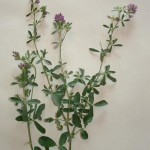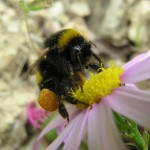by Catherine Haug, April 7, 2013
Thanks to Jean H. for this kitchen hint.
(Walnut photo, right, from Wikipedia; knife photo, below, from Amazon)
How do you chop nuts?
If you use a food processor, you know that they can quickly be reduced to a paste, as the processor extracts oil from the nuts.
Most chefs use a Chef’s Knife in a rocking motion over the nuts on a cutting board or counter. But this requires holding your fingers on the nuts as you chop – risking bits of finger in the nuts….
If you use a knife on a board or counter, you know that they tend to scatter all over the counter as you chop. To minimize scattering, use a bread knife – the kind that has a scalloped serrated cutting edge, as in photo, below.




